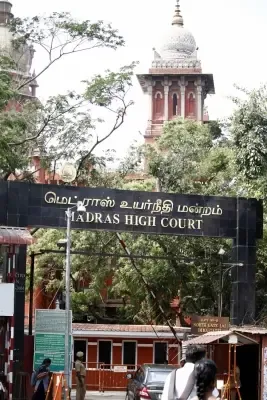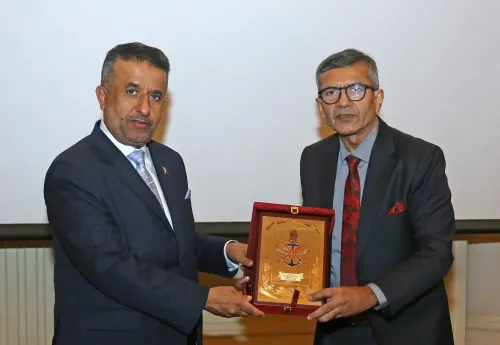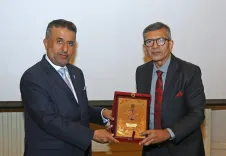Is the 30% Interest Charged by Film Financiers Legal? Madras HC Grants Relief to Actor Vishal

Synopsis
Key Takeaways
- Madras High Court questions 30% interest rates.
- Concerns raised about exploitation in film financing.
- Interim relief granted to actor Vishal.
- Legal scrutiny of Tamil Nadu lending practices.
- Potential reform in film industry financing.
Chennai, Nov 24 (NationPress) The Madras High Court initiated an important dialogue regarding the legitimacy and ethical implications of exorbitant interest rates imposed by film financiers, asserting that rates reaching 30 percent annually could be seen as exploitative, even in high-stakes commercial dealings.
This legal scrutiny arises from an ongoing financial dispute involving actor-producer Vishal Krishna Reddy and Lyca Productions.
A division bench comprising Justices S.M. Subramaniam and Mohammed Shaffiq examined an appeal brought forth by Vishal, expressing concerns over the widespread practice in the Tamil film industry where lenders frequently impose heavy interest rates on loans provided to producers and actors.
The judges noted that at first glance, a 30 percent annual interest rate seemed excessive and required judicial scrutiny.
The case originated from a June 2025 ruling by a single judge instructing Vishal to pay ₹30.05 crore to Lyca Productions, along with a 30 percent interest rate starting from February 16, 2021.
During the hearing on Monday, Lyca's legal representative informed the bench that the total liability had escalated to ₹54 crore.
In contrast, senior counsel A.K. Sriram, representing Vishal, indicated that the interest alone had surged to approximately ₹40 crore, underscoring the overwhelming financial pressure.
The bench questioned whether such substantial interest demands were permissible under the Tamil Nadu Prohibition of Charging Exorbitant Interest Act, 2003, and associated legislation.
Justice Subramaniam remarked, "A borrower may enter into an agreement out of necessity, but the key issue is whether the law permits such interest rates to be levied."
He added, "No individual should be allowed to exploit another, regardless of their financial circumstances."
In granting interim relief to Vishal, the bench suspended the single judge's order on the condition that he deposit ₹10 crore with the High Court.
The Registry was directed to keep this amount in an interest-bearing account while the appeal is ongoing.
The appeal contests the findings of Justice P.T. Asha, who had previously upheld the 30 percent interest clause, referencing a 2010 case involving Indiabulls Financial Services Ltd vs Jubilee Plots and Housing Private Ltd, where the High Court declined to intervene in a 33 percent interest rate.
Justice Asha further explained that the 2003 Act was designed to safeguard small borrowers and not large-scale commercial loans involving substantial amounts.
However, the division bench signaled that overarching principles of fairness and legality should govern all lending practices, paving the way for a more thorough judicial review of high-interest financing methods within the Tamil film sector.









